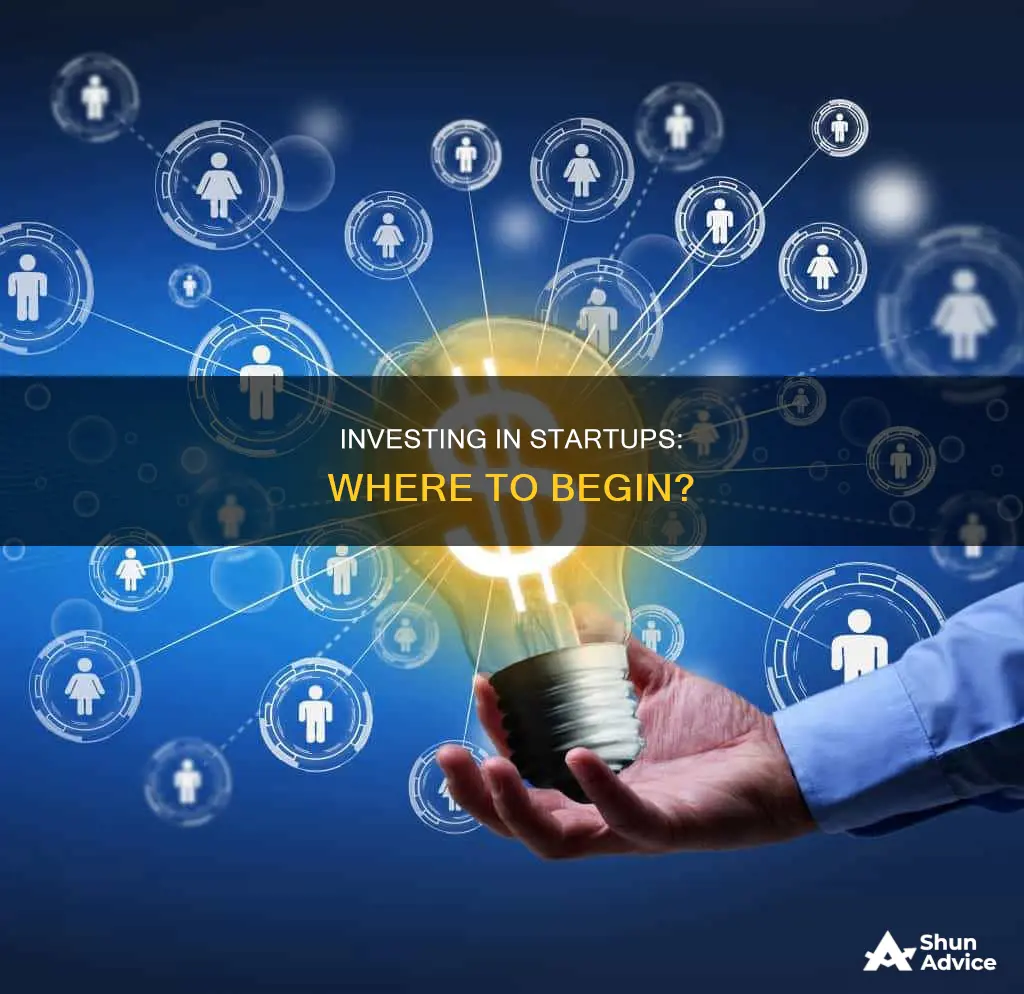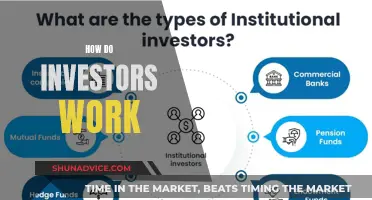
Investing in startups is a risky business. While it used to be that you needed wealth and connections to invest in startups, it is now possible for average investors to get a piece of the action through crowdfunding sites. Startups are usually newly established private companies that are less than 10 years old, and are designed to scale very quickly. They are often founded by a small group of people who have an idea they want to turn into reality.
Investing in startups is not a safe option—in fact, many startups fail. However, for those who are passionate about a project or believe in the people behind it, it can be an attractive prospect. Startup investors are essentially buying a piece of the company with their investment. They put down capital in exchange for equity: a portion of ownership in the startup and rights to its potential future profits.
| Characteristics | Values |
|---|---|
| Risk | High |
| Returns | High |
| Liquidity | Low |
| Investor Type | Angel, Venture Capitalist, Friends & Family, Crowdfunding |
| Investor Rights | Ownership, Profits, Advisory Roles |
| Investor Due Diligence | Business Plan, Passion, Connections, Diversification |
| Stages | Seed, Angel, Venture Capital |
What You'll Learn

Investing in Startups via Crowdfunding Sites
Crowdfunding sites have opened up startup investing to the average investor, meaning you no longer need wealth and connections to get involved. These sites offer curated selections of startups, with varying minimum buy-ins, and they can be a great way to get a piece of an exciting startup opportunity.
How it Works
When you invest in a startup via a crowdfunding site, you enter into an investment contract with the company. There are four main types of investment contracts, each offering different ways to make money:
- Debt: This treats your money like a loan that earns interest. The contract may pay out a fixed or variable return, depending on how the business performs.
- Convertible note: This is a form of debt that converts into shares when the startup achieves certain goals, such as gaining new rounds of funding. You make money when the company is purchased or goes public.
- Stock: Later-stage startups may let you buy shares, much like with a publicly traded company. However, you can't sell your shares, so you'll need to hold on to them until the startup is purchased or goes public.
- Dividends: Successful later-stage startups may offer investors the ability to buy shares that pay annual dividends.
Risks and Rewards
Startup investing is potentially lucrative, but it's important to understand the risks. The vast majority of startups fail, so even if you do your research, you could lose everything. It's generally recommended to make several small investments in different startups, rather than one big investment.
Startup investing is very risky because many startups fail to return investors' money, and it can be difficult to sell equity before the company IPOs. However, this increased risk is coupled with the potential for a large return if the startup succeeds.
Due Diligence
Before investing, it's important to do your due diligence. Ask yourself the following:
- Is this a field, industry, or product that I'm familiar with?
- Is the team passionate about their idea?
- Does the startup have domain expertise?
- How big is the market?
Other Considerations
Keep in mind that startup investing is not for everyone. It's very risky and often illiquid, with your money tied up for at least three to five years. It can also take a long time to see results, even if the startup succeeds. Talk to a financial advisor to ensure that this type of investing aligns with your long-term financial goals.
Why Invest in Entertainment?
You may want to see also

The Risks and Rewards of Investing in Startups
Investing in startups is a risky business. While it can be very lucrative, it's important to understand the challenges and potential pitfalls.
The Risks
Startups are newly established private companies, often less than 10 years old, that are designed to scale very quickly. They usually begin as small operations, developing an initial idea, and then seek funding from venture capitalists and angel investors to build their businesses.
The majority of startups fail, and investors can lose their entire investment. Startups are also illiquid investments, meaning it can be difficult to convert your investment into cash. Your money may be tied up for at least three to five years, if not more.
Additionally, it can take a long time to see results, even if a startup succeeds. Investors need to be patient and allow the company time to grow.
The Rewards
Investing in startups can provide enormous returns if the company succeeds. For example, early investors in Alphabet Inc. (Google) saw a return of almost 1,700%.
Investing in startups can also offer diversification to your portfolio, as it is a high-risk, high-reward asset class. It can be a way to support new entrepreneurs and be part of innovative solutions to challenging problems.
For those who can afford to take the risk, investing in startups can provide an opportunity to be part of something exciting and potentially life-changing.
Factors to Consider
When considering investing in a startup, it is essential to do your research and carefully evaluate the company. Here are some key factors to consider:
- The team's passion and drive: Are the founders dedicated and open to advice?
- The business plan: Does the startup have a solid plan with clear projections and a viable model for generating profits?
- The market: Is there a large and growing market for the product or service?
- The competition: Are there strong competitors or major barriers to entry?
- Regulatory issues: Are there any legal, regulatory, or compliance issues that may impact the business?
- Your financial situation: Can you afford to lose the money you are investing?
Ways to Invest
There are several ways to invest in startups:
- Friends and family funding: Many startups begin with funding from founders' friends and family.
- Angel investing: Angel investors are typically private individuals who invest in early-stage companies. They usually provide the first round of funding outside of friends and family money.
- Venture capital: Venture capitalists often seek a stake in more established startups and may take on advisory roles.
- Investment platforms: There are also online platforms that connect startups with small investors, such as SeedInvest, WeFunder, and FundersClub.
Investing in startups is a risky venture, but it can also be rewarding. It is crucial to understand the risks involved and ensure that any investment aligns with your financial goals and risk tolerance. Diversification and thorough research are key to mitigating some of the risks associated with startup investing.
Education and Investment: Any Correlation?
You may want to see also

Stages of a Startup
Idea Phase
Every startup begins with an idea. In this first phase, the founders do not yet have a working product, a customer base, or a revenue stream. They may have to use their savings, obtain bank loans, or issue equity shares to fund themselves.
Seed Phase
During the seed phase, the first employees may be hired and prototypes developed to pitch the company's idea to potential customers or later investors. The money invested can be used for performing market research and other tasks that help validate a founder's proposal.
Operations Phase
Once a new company moves into operations and starts collecting some initial revenue, it has progressed from seed to a bona fide startup. At this point, company founders may pitch their ideas to angel investors, who are usually private individuals with some accumulated wealth who specialise in investing in early-stage companies. Angel money may be used to support initial marketing efforts and move a prototype into production.
Business Plan Phase
By this point, the founders should have developed a solid business plan that dictates the business strategy and projections going forward. Although the company is not yet earning any net profits, it is gaining momentum and reinvesting any revenues back into the company for growth.
Venture Capital Phase
Venture capital can come from an individual, a private partnership, or a pooled investment fund. Most demand an active role in promising new companies that have moved past the seed and angel stages. Additional rounds of venture capital may be sought as the company continues to burn through cash in order to achieve exponential growth.
Forging Checks: A Risky Investment Gamble
You may want to see also

How to Invest in Startups as an Individual
Investing in startups can be a risky but rewarding endeavour. Startups are newly established private companies (5–10 years old) that are designed to scale very quickly. They often seek funding from venture capitalists and angel investors to build out their businesses.
Investment Platforms and Crowdfunding
One of the best ways for individuals to invest in startups is through investment platforms and crowdfunding sites. These platforms allow investors to browse and choose from a curated selection of startups, with varying minimum buy-ins. Some popular platforms include:
- SeedInvest: Requires a minimum investment of $500, with over 150 companies funded.
- WeFunder: Minimum investment of $100, featuring "moonshot" companies and entertainment ventures.
- FundersClub: Investment minimums depend on the company, and it is only available to accredited investors.
- Republic: Allows individuals to invest with as little as $10.
- MicroVentures: Invest in early-stage and late-stage startups for a minimum of $100.
Angel Investing
Angel investors are accredited investors who typically provide the first check to startups. They can write a smaller check as part of the startup seed round or provide the whole check, usually less than $1 million. Being an angel investor is risky, but it can be a good tax write-off, and there is a potential for a high return if the startup succeeds. However, sourcing opportunities can be challenging. Angel investors often work with institutions that help startups or tap into their network to offer business advice or funding.
Investing in a Friend's Startup
Another way to invest in startups is to find a personal connection to a startup that is looking for funding. Many startups rely on friends and family for early rounds of funding. Investing in a friend's startup allows individuals to have direct access to information about the company, including the business plan, mission statement, and hiring schedule. It also provides an opportunity to support a project and people they believe in.
Diversification
It is important to remember that startup investing is a high-risk endeavour, with a high potential for loss. Individuals should consider diversifying their investment portfolio by investing smaller amounts in multiple startups rather than a large amount in a single startup. This strategy increases the chances of investing in a successful company.
Additionally, individuals should consult with a financial advisor to ensure that their investments align with their long-term financial goals and that they are aware of any applicable rules and regulations regarding startup investments.
Insurance: A Safe Investment Bet?
You may want to see also

Understanding Startup Equity Investments
Startup equity investments are a risky but potentially lucrative opportunity for investors. Equity investments in startups are typically very illiquid and carry a high risk of loss, but they can also offer enormous returns if the startup succeeds.
A startup is a newly established private company (5-10 years old) that is designed to scale very quickly. Startups often relate to the tech field but not always. They are usually founded by a small group of people with an idea they want to turn into reality.
Equity essentially means ownership. Equity represents an investor's percentage of ownership interest in a company. When investors put money into a startup, they are buying a piece of the company in exchange for a portion of ownership and rights to its potential future profits.
There are two main ways to invest in early-stage startups:
- Investing in a priced equity round: Investors purchase shares in a startup at a fixed price.
- Investing in convertible securities: The investment amount eventually "converts" into equity.
Seed and early-stage investors often invest via convertible securities, while investors in later-stage startups will more commonly invest in priced equity rounds.
Startups often require significant capital to scale and build their business. By raising venture capital, startups can access the necessary funds without taking on debt. However, the trade-off is that they give up a percentage of ownership and future profits to investors.
Risks and Rewards of Startup Equity Investments
Investing in startup equity is very risky because many startups fail, and it can be difficult to sell equity before the company goes public (Initial Public Offering or IPO). However, this increased risk is coupled with the potential for a substantial return if the startup succeeds.
Who Can Invest in Startups?
Historically, startup investing was limited to wealthy, accredited investors. However, with the rise of crowdfunding platforms, it is now possible for average individuals to invest in startups as well. These platforms offer curated selections of startups and require varying minimum buy-ins, making startup investing more accessible.
Things to Consider Before Investing in Startups
Investing in startups carries a high level of risk, so it is important to do thorough research and due diligence. Consider factors such as the team's passion and expertise, the size of the market, and the viability of the business idea. Diversification is also key—invest in multiple startups rather than putting all your eggs in one basket.
Startup equity investments offer the potential for high returns but come with significant risks. Investors should carefully evaluate their financial situation and risk tolerance before considering this type of investment.
Investment Strategies: How to Choose?
You may want to see also
Frequently asked questions
A startup is a newly established private company that is less than 5-10 years old. Startups are generally founded by a small group of people who have an idea they want to turn into a reality.
People can invest in startups through crowdfunding sites, investment platforms, or by becoming an angel investor.
An angel investor is an accredited investor that typically provides the first check to startups looking to prove their ideas. They are considered to be very risky but can be a good tax write-off.
Investing in startups is risky as the majority of new companies fail. However, the ones that succeed can produce very high returns on investment.







